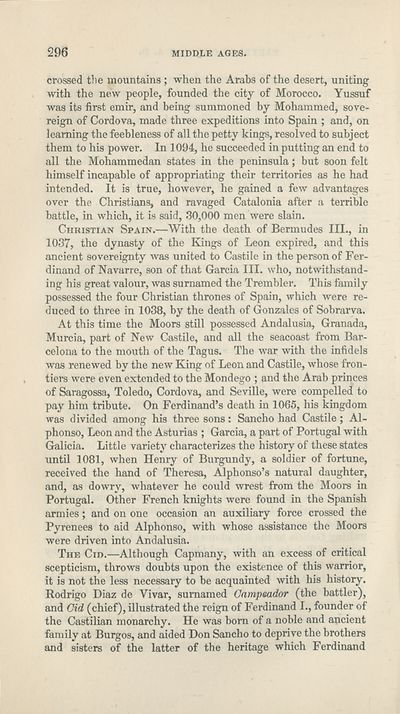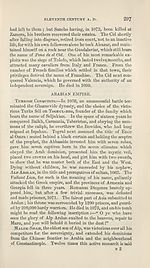Download files
Complete book:
Individual page:
Thumbnail gallery: Grid view | List view

296
MIDDLE AGES.
crossed the mountains ; when the Arabs of the desert, uniting
with the new people, founded the city of Morocco. Yussuf
was its first emir, and being summoned by Mohammed, sove¬
reign of Cordova, made three expeditions into Spain ; and, on
learning the feebleness of all the petty kings, resolved to subject
them to his power. In 1094, he succeeded in putting an end to
all the Mohammedan states in the peninsula; but soon felt
himself incapable of appropriating their territories as he had
intended. It is true, however, he gained a few advantages
over the Christians, and ravaged Catalonia after a terrible
battle, in which, it is said, 30,000 men were slain.
Christian Spain.—With the death of Bermudes III., in
1037, the dynasty of the Kings of Leon expired, and this
ancient sovereignty was united to Castile in the person of Fer¬
dinand of Navarre, son of that Garcia III. who, notwithstand¬
ing his great valour, was surnamed the Trembler. This family
possessed the four Christian thrones of Spain, which were re¬
duced to three in 1038, by the death of Gonzales of Sobrarva.
At this time the Moors still possessed Andalusia, Granada,
Murcia, part of New Castile, and all the seacoast from Bar¬
celona to the mouth of the Tagus. The war with the infidels
was renewed by the new King of Leon and Castile, whose fron¬
tiers were even extended to the Mondego ; and the Arab princes
of Saragossa, Toledo, Cordova, and Seville, were compelled to
pay him tribute. On Ferdinand’s death in 1065, his kingdom
was divided among his three sons: Sancho had Castile; Al-
phonso, Leon and the Asturias ; Garcia, a part of Portugal with
Galicia. Little variety characterizes the history of these states
until 1081, when Henry of Burgundy, a soldier of fortune,
received the hand of Theresa, Alphonso’s natural daughter,
and, as dowry, whatever he could wrest from the Moors in
Portugal. Other French knights were found in the Spanish
armies; and on one occasion an auxiliary force crossed the
Pyrenees to aid Alphonso, with whose assistance the Moors
were driven into Andalusia.
The Cid.—Although Capmany, with an excess of critical
scepticism, throws doubts upon the existence of this warrior,
it is not the less necessary to be acquainted with his history.
Rodrigo Diaz de Vivar, surnamed Campeador (the battler),
and Cid (chief), illustrated the reign of Ferdinand L, founder of
the Castilian monarchy. He was born of a noble and ancient
family at Burgos, and aided Don Sancho to deprive the brothers
and sisters of the latter of the heritage which Ferdinand
MIDDLE AGES.
crossed the mountains ; when the Arabs of the desert, uniting
with the new people, founded the city of Morocco. Yussuf
was its first emir, and being summoned by Mohammed, sove¬
reign of Cordova, made three expeditions into Spain ; and, on
learning the feebleness of all the petty kings, resolved to subject
them to his power. In 1094, he succeeded in putting an end to
all the Mohammedan states in the peninsula; but soon felt
himself incapable of appropriating their territories as he had
intended. It is true, however, he gained a few advantages
over the Christians, and ravaged Catalonia after a terrible
battle, in which, it is said, 30,000 men were slain.
Christian Spain.—With the death of Bermudes III., in
1037, the dynasty of the Kings of Leon expired, and this
ancient sovereignty was united to Castile in the person of Fer¬
dinand of Navarre, son of that Garcia III. who, notwithstand¬
ing his great valour, was surnamed the Trembler. This family
possessed the four Christian thrones of Spain, which were re¬
duced to three in 1038, by the death of Gonzales of Sobrarva.
At this time the Moors still possessed Andalusia, Granada,
Murcia, part of New Castile, and all the seacoast from Bar¬
celona to the mouth of the Tagus. The war with the infidels
was renewed by the new King of Leon and Castile, whose fron¬
tiers were even extended to the Mondego ; and the Arab princes
of Saragossa, Toledo, Cordova, and Seville, were compelled to
pay him tribute. On Ferdinand’s death in 1065, his kingdom
was divided among his three sons: Sancho had Castile; Al-
phonso, Leon and the Asturias ; Garcia, a part of Portugal with
Galicia. Little variety characterizes the history of these states
until 1081, when Henry of Burgundy, a soldier of fortune,
received the hand of Theresa, Alphonso’s natural daughter,
and, as dowry, whatever he could wrest from the Moors in
Portugal. Other French knights were found in the Spanish
armies; and on one occasion an auxiliary force crossed the
Pyrenees to aid Alphonso, with whose assistance the Moors
were driven into Andalusia.
The Cid.—Although Capmany, with an excess of critical
scepticism, throws doubts upon the existence of this warrior,
it is not the less necessary to be acquainted with his history.
Rodrigo Diaz de Vivar, surnamed Campeador (the battler),
and Cid (chief), illustrated the reign of Ferdinand L, founder of
the Castilian monarchy. He was born of a noble and ancient
family at Burgos, and aided Don Sancho to deprive the brothers
and sisters of the latter of the heritage which Ferdinand
Set display mode to:
![]() Universal Viewer |
Universal Viewer | ![]() Mirador |
Large image | Transcription
Mirador |
Large image | Transcription
| Antiquarian books of Scotland > Education > Elements of universal history on a new and systematic plan > (316) |
|---|
| Permanent URL | https://digital.nls.uk/127583932 |
|---|
| Description | Thousands of printed books from the Antiquarian Books of Scotland collection which dates from 1641 to the 1980s. The collection consists of 14,800 books which were published in Scotland or have a Scottish connection, e.g. through the author, printer or owner. Subjects covered include sport, education, diseases, adventure, occupations, Jacobites, politics and religion. Among the 29 languages represented are English, Gaelic, Italian, French, Russian and Swedish. |
|---|

